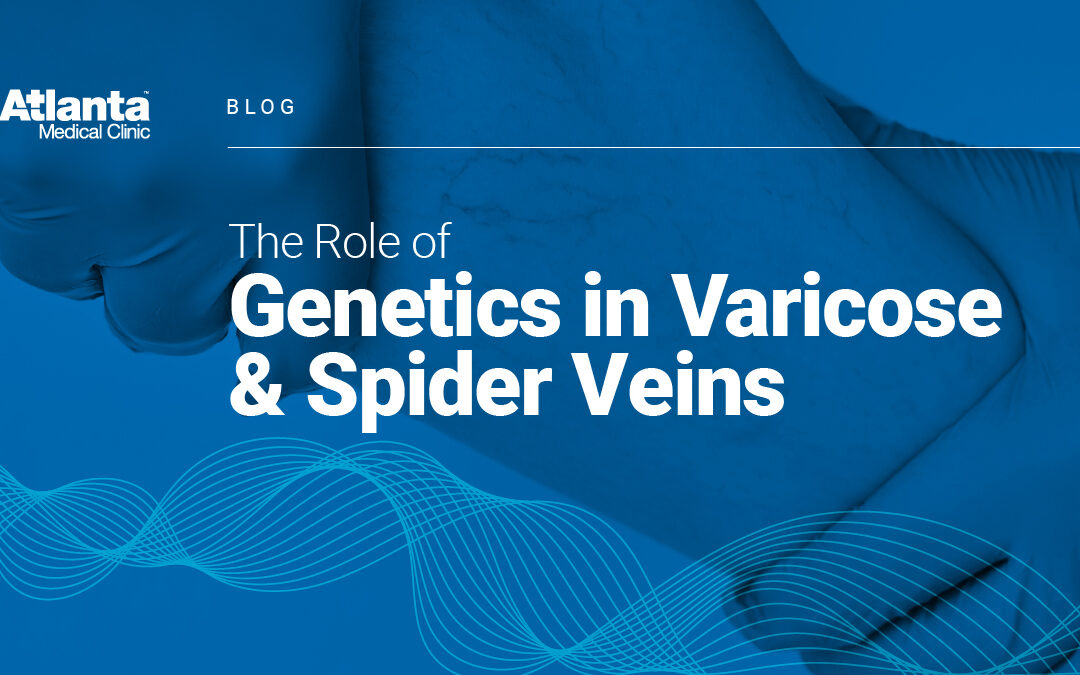Did you realize that nearly 40 million adults in the United States are affected by varicose veins? These veins, distinguished by their prominent size and deep purple hue, extend beyond mere cosmetic issues. They’re associated with an array of unpleasant symptoms, ranging from discomfort and swelling to the risk of blood clots and muscle cramps. In this blog, we’ll explore what causes varicose veins, their link to genetics and how our vein clinic in Atlanta can help you find relief.
What Causes Varicose Veins?
Varicose veins occur when blood pressure increases, making the veins stretch and weaken. Common causes include the following:
- Genetics: Genetics plays a significant role in the development of varicose veins, with familial predispositions often influencing susceptibility. If close relatives have experienced varicose veins, there’s a higher likelihood of inheriting the condition due to shared genetic factors.
- Obesity: Obesity is a prevalent factor contributing to varicose veins, as excess weight puts increased pressure on the veins, leading to their stretching and weakening. The added strain from carrying excess body fat can exacerbate vein-related symptoms and further elevate the risk of developing varicose veins.
- Sedentary lifestyle: A sedentary lifestyle is a common contributor to varicose veins, as prolonged periods of inactivity can impede blood circulation, leading to vein dilation and weakening. Lack of regular movement and physical activity can exacerbate the risk of developing varicose veins, highlighting the importance of staying active for vascular health.
- Older age: Advanced age is a significant risk factor for varicose veins, as veins naturally lose elasticity and valves weaken over time, leading to decreased efficiency in blood circulation. With age, the likelihood of developing varicose veins increases, underscoring the importance of proactive measures to maintain vein health as one grows older.
While anyone can develop varicose veins, you’re at higher risk if you have a family history of the condition. Things like obesity, limited motion and old age can also increase your risk.
Can I Prevent Varicose Veins?
Worried about varicose veins? You can reduce your risk by implementing the following lifestyle habits:
- Healthy diet: Maintaining a balanced and nutritious diet not only supports overall health but also plays a crucial role in reducing the risk of varicose veins by helping to manage weight and promote optimal circulation. Incorporating plenty of fiber-rich fruits and vegetables, lean proteins, and whole grains while limiting processed foods and excessive salt intake can contribute to maintaining a healthy weight and reducing the strain on veins, ultimately lowering the likelihood of developing varicose veins.
- Regular exercise: Regular physical activity is key to reducing the risk of varicose veins by promoting healthy blood flow and strengthening the muscles that support vein function. Engaging in activities such as walking, swimming, or cycling not only helps to prevent blood from pooling in the veins but also aids in maintaining overall cardiovascular health. Aim for at least 30 minutes of moderate-intensity exercise most days of the week to support vein health and minimize the likelihood of developing varicose veins.
- Loose clothing: Choosing loose-fitting clothing is essential for preventing varicose veins as tight garments can constrict blood flow, increasing the risk of vein damage and exacerbating existing symptoms. Opting for clothing that allows for comfortable movement and doesn’t compress the veins helps to promote healthy circulation throughout the body, reducing the likelihood of developing varicose veins and alleviating discomfort associated with vein issues.
- Proper leg positions: Being mindful of your leg positions is crucial in preventing varicose veins. Avoiding prolonged periods of leg crossing and instead opting for positions that promote healthy blood circulation, such as keeping your feet elevated when sitting, can help alleviate pressure on the veins and reduce the risk of varicose vein development. By adopting proper leg positions, you can mitigate strain on your veins and support overall vein health.
While these suggestions can help lower your risk, you can’t always prevent varicose veins from occurring—especially if you have a genetic predisposition.
How Do I Treat Varicose Veins?
Nobody wants to deal with varicose veins. Fortunately, there are treatments available to help close damaged veins, redirecting blood flow to healthier veins instead. We offer the following minimally invasive, non-surgical treatments:
- Radiofrequency ablation (RFA): In this procedure, radiofrequency energy is delivered to veins via a catheter. This energy makes the damaged veins shrink, collapse and close. As a result, blood only flows through your healthier veins.
- ClariVein OC: Like RFA, this treatment uses a catheter. However, instead of radiofrequency energy, it relies on medication to close veins.
- Sclerotherapy: This treatment utilizes liquid, which is injected into the veins via a thin needle. As the liquid enters, it begins shutting down the damaged veins by making them stick together. This treatment is especially effective for spider veins, which are smaller and closer to the skin surface.
Unsure which treatment is right for you? Our vein doctors in Atlanta are here to help.
Where Can I Find Vein Specialists Near Me?
Are you interested in varicose vein treatment? Maybe you need pain relief, or perhaps you’re concerned about your family history and want to be proactive. Either way, our team can help. After considering your symptoms and risk factors, our team will devise a personalized plan tailored to your unique needs. Our treatments are designed to be safe, effective and long-lasting. Schedule a free consultation with our medical team today!

